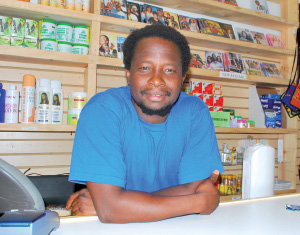
By LESLIE COLLINS
Northeast News
December 5, 2012
For residents of Historic Northeast, soccer is a unifying sport that transcends language barriers and ethnic backgrounds.
“It’s one of the sports that’s growing in the United States again,” said Foday Kamara, owner of the Little Burma Grocery Store on Independence Avenue in Northeast and founder of United Immigrants Soccer Club.
Kamara, an immigrant from Africa, grew up playing soccer and earned a high school scholarship for his goalie skills.
“See all this?” he said, pointing to his legs. “All these bruises are from soccer.”
Among the immigrant population, soccer is a popular sport, he said.
“It’s what they know,” Kamara said matter-of-factly.
Kamara recently founded the United Immigrants Soccer Club to give area youth and young adults a positive outlet.
“I want to keep these kids where they’re supposed to be at. I don’t want them in the streets,” he said. “They’re not my kids, but I think of them as my kids.”
Kamara moved to the U.S. in September of 2004 as a refugee, who lived through the Sierra Leone Civil War which began in the 1990s and lasted 11 years.
“There’s no refugee here in the United States that will be able to express and tell you exactly what happened when there’s war time,” he said. “It’s a long and sad story.”
And it’s one he prefers not to tell.
A number of his family members died during the war, which he calls one of the most brutal wars in the history of Africa. Separated from his family, he learned to survive on his own.
“When you live in a war country, everybody’s a fighter. You have to fight to survive,” he said.
It’s estimated that more than 50,000 Sierra Leoneans died as a result of the war and 2.5 million people were displaced. Rebel forces coerced children to join their ranks and pillaged villages. To punish citizens for voting for President Ahmad Tejan Kabbah, the rebels would crudely amputate their limbs, which in turn, hindered an individual’s ability to make a living.
“War is one of the scariest things you’re going to meet or see in life,” he said. “I wish and pray to God all the time in my life that war never comes here to the United States.”
For Kamara, there is joy in soccer and it’s a sport he uses to unify the various immigrants of Northeast. There are players from Kenya, Thailand, Somalia, Tanzania, the list continues. Those who aren’t immigrants are also welcome to play, he said. During practice, Kamara mixes up the groups for scrimmages and said, “When it’s time to practice, everybody’s friendly.”
Earlier this summer, his women’s league took first place at an El Padrino Premier Soccer League tournament. He proudly displays the trophy on his desk.
Kamara wants to be a positive influence in Northeast and doesn’t mind printing off job applications for area residents or driving them to a job interview.
“I didn’t have nobody to help me,” he said. “I know how it feels.”
He encourages his players to avoid negative influences and refrain from drinking alcohol and doing drugs.
“Don’t let anybody influence you to do something that is wrong,” he tells his players. “Always try to get around good people and always try to sit with somebody who is older than you and try to learn from their mistakes.”
Currently, Kamara is the only coach for United Immigrants Soccer Club and uses his own money to purchase items like soccer balls, cleats and soccer goals. While his women’s team has jerseys, he’s still working to finance jerseys for the boys’ team.
“The parents are poor. They don’t have the money to buy them cleats, a backpack, a water bottle,” he said.
Volunteering or financial assistance would be welcome, he said.
Kamara said he wants to give back to the community and help others have a better life than he did growing up.
“I don’t want to be selfish in the world,” he said. “I want to do a great thing in Northeast.”















